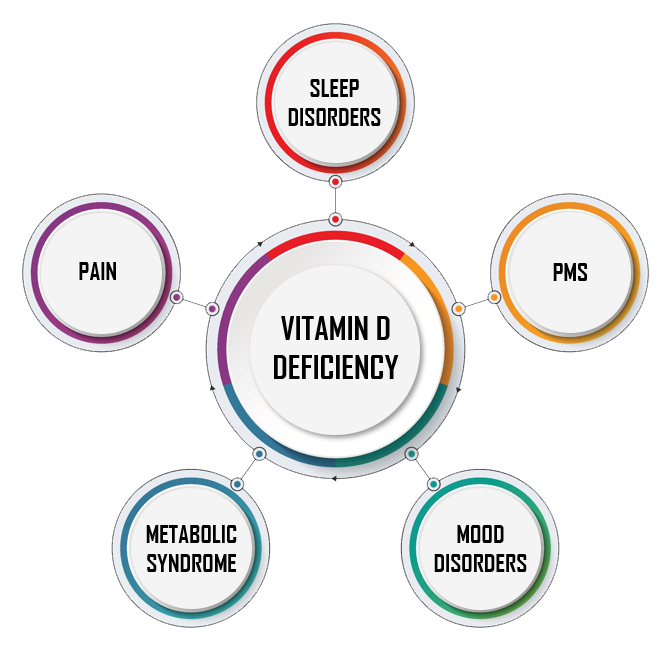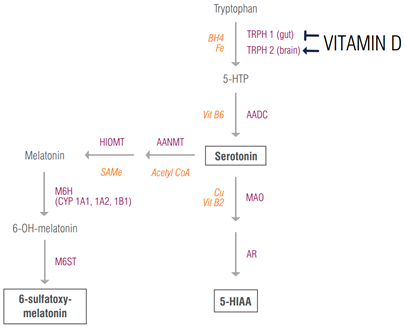
By Dr Kate Placzek, ZRT Laboratory
We love talking about the sun! We grumble about it being hidden away behind heavy rain clouds for months at a time in the winter; we delight in the first breakthrough rays in the spring, realizing our pagan longing for it, watching, as if for the first time, as everything around us wakes up from a deep slumber; we marvel at its delightful, almost intoxicating warmth in the early summer; and yes, we find it irritating when the temperature goes a dash over 80 degrees, or if stays too hot for too long into the fall. Our enthusiasm for the sun’s activities makes sense - after all, humans have evolved to rely on sunlight and center many of our activities around its presence.
The “Sunshine Vitamin”

Not unlike stimulating photosynthesis in plants, inside our human bodies sunlight sets in motion a series of biochemical events that are essential to our well-being. Proclaimed as a vitamin, vitamin D is actually a precursor to a fat-soluble hormone – a substance that our skin produces in response to being out and about, all the while soaking up those rays of sun. Vitamin D is best known to keep our bones healthy and strong by helping to assimilate calcium from our diet into skeletal tissues.
And it does so much more! At the DNA level, the active form of vitamin D regulates the expression of hundreds of genes, turning them on or off at precisely the right time. It’s no wonder that if humans don’t get enough of this “sunshine vitamin”, deficiencies can be linked to or exacerbate a variety of disorders, such as seasonal affective disorder, mania [1], psychosis [2], depression [3], metabolic syndrome [4], irritable bowel disease [5], chronic back pain [6], increased severity of PMS symptoms [7], and sleep disorders [8].
Shining Some Light on Low Vitamin D
Emphasized by dermatologists, the danger of ultraviolet radiation is now embedded into our psyche. Going out into the fierce midday light without first slathering on full-strength sunscreen feels plain wrong. We have become really good at blocking harmful sun’s rays to prevent solar souvenirs that can angrily inflame our skin. However, at the same time it is also so easy to forget about those pathways that are nourished by sunlight. Vitamin D biosynthesis is one such pathway. Without adequate doses of unblocked sunlight, foods fortified with the vitamin or just straightforward supplementation, one risks falling into the low vitamin D zone. Unfortunately, there is no one symptom that indicates an overt vitamin D deficiency. But one way that such a deficiency can manifest is through sleep disturbances.
Vitamin D and Sleep
Sleep is something we often take for granted and discuss frequently in the context of its absence. After all, humans are wired that way – we have a physiological need to sleep. And when we don’t get enough good quality sleep, we just don’t feel right. What many folks don’t realize is just how important vitamin D is for sleep.
In a recent study, sleep quality was assessed in participants with sleep disorders. The authors reported that vitamin D improved sleep quality, reduced sleep latency, raised sleep duration and improved subjective sleep quality [9]. This and other studies highlight the important and powerful connection between vitamin D and sleep [10, 11, 12, 13, 14, 15].
Vitamin D and Melatonin

The mechanism of exactly how vitamin D contributes to a healthy slumber is not quite elucidated; however, clinical science is just beginning to address this enigmatic process. At least in part, it appears that it might have something to do with vitamin D’s regulation of tryptophan hydroxylase (TRPH) expression – the rate-limiting enzyme in serotonin (and consequently melatonin) production [16]. Vitamin D potentiates the expression of neuronal TRPH to stimulate the appropriate production of serotonin in the brain [17, 18]. Without sufficient serotonin production, melatonin levels will not rise appropriately to give the body that signal to go to sleep at night.
How to Get Enough Vitamin D
A balanced approach to direct sun exposure (too much sun is damaging to skin cells and can increase the risk of skin cancer), eating foods rich in vitamin D (eggs, liver, fatty fish, red meat), and maybe even supplements may be helpful for people who are looking to increase their vitamin D levels. Whether to choose supplements or sunlight to get your vitamin D quota might be worth discussing with your doctor. Vitamin D adequacy can easily be assessed by a simple blood spot test.
Related Tests
Vitamin D 25-oh total (Testing Vitamin D2 & D3)
References
[1] Altunsoy, N., et al., Exploring the relationship between vitamin D and mania: correlations between serum vitamin D levels and disease activity. Nord J Psychiatry, 2018: p. 1-5.
[2] Hedelin, M., et al., Dietary intake of fish, omega-3, omega-6 polyunsaturated fatty acids and vitamin D and the prevalence of psychotic-like symptoms in a cohort of 33 000 women from the general population. BMC Psychiatry, 2010. 10: p. 38-38.
[3] Bahrami, A., et al., High Dose Vitamin D Supplementation Is Associated With a Reduction in Depression Score Among Adolescent Girls: A Nine-Week Follow-Up Study. J Diet Suppl, 2017: p. 1-10.
[4] Schmitt, E.B., et al., Vitamin D deficiency is associated with metabolic syndrome in postmenopausal women. Maturitas, 2018. 107: p. 97-102.
[5] Branco, J.C., et al., Vitamin D Deficiency in a Portuguese Cohort of Patients with Inflammatory Bowel Disease: Prevalence and Relation to Disease Activity. GE Port J Gastroenterol, 2019. 26(3): p. 155-162.
[6] Ghai, B., et al., Vitamin D Supplementation in Patients with Chronic Low Back Pain: An Open Label, Single Arm Clinical Trial. Pain Physician, 2017. 20(1): p. E99-E105.
[7] Jarosz, A.C. and A. El-Sohemy, Association between Vitamin D Status and Premenstrual Symptoms. J Acad Nutr Diet, 2019. 119(1): p. 115-123.
[8] Zhao, K., et al., Low serum 25-hydroxyvitamin D concentrations in chronic insomnia patients and the association with poor treatment outcome at 2months. Clin Chim Acta, 2017. 475: p. 147-151.
[9] Majid, M.S., et al., The effect of vitamin D supplement on the score and quality of sleep in 20-50 year-old people with sleep disorders compared with control group. Nutr Neurosci, 2018. 21(7): p. 511-519.
[10] Kim, J.H., et al., Association between self-reported sleep duration and serum vitamin D level in elderly Korean adults. J Am Geriatr Soc, 2014. 62(12): p. 2327-32.
[11] Bozkurt, N.C., et al., The relation of serum 25-hydroxyvitamin-D levels with severity of obstructive sleep apnea and glucose metabolism abnormalities. Endocrine, 2012. 41(3): p. 518-25.
[12] Gominak, S.C. and W.E. Stumpf, The world epidemic of sleep disorders is linked to vitamin D deficiency. Med Hypotheses, 2012. 79(2): p. 132-5.
[13] Gong, Q.H., et al., 25-Hydroxyvitamin D Status and Its Association with Sleep Duration in Chinese Schoolchildren. Nutrients, 2018. 10(8).
[14] Gao, Q., et al., The Association between Vitamin D Deficiency and Sleep Disorders: A Systematic Review and Meta-Analysis. Nutrients, 2018. 10(10).
[15] Dogan-Sander, E., et al., Association of serum 25-hydroxyvitamin D concentrations with sleep phenotypes in a German community sample. PLoS One, 2019. 14(7): p. e0219318.
[16] Muscogiuri, G., et al., The lullaby of the sun: the role of vitamin D in sleep disturbance. Sleep Med, 2019. 54: p. 262-265.
[17] Patrick, R.P. and B.N. Ames, Vitamin D hormone regulates serotonin synthesis. Part 1: relevance for autism. FASEB. J, 6/2014. 28(6): p. 2398-2413.
[18] Patrick, R.P. and B.N. Ames, Vitamin D and the omega-3 fatty acids control serotonin synthesis and action, part 2: relevance for ADHD, bipolar disorder, schizophrenia, and impulsive behavior.Faseb J, 6/2015. 29(6): p. 2207-2222.


